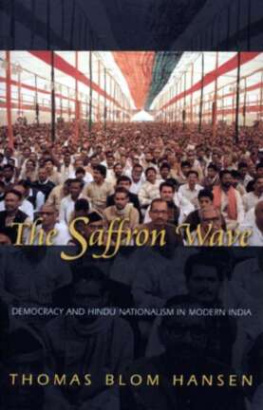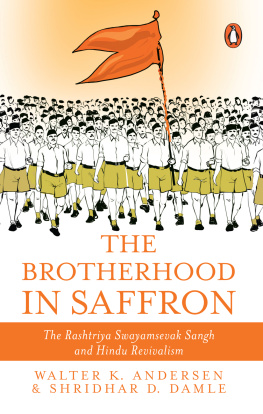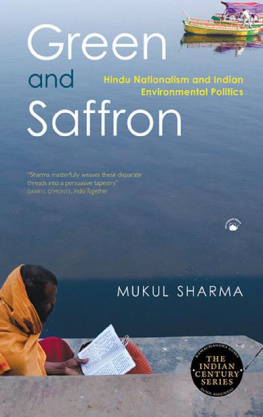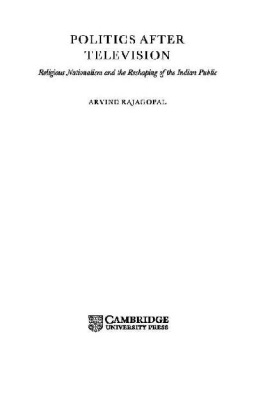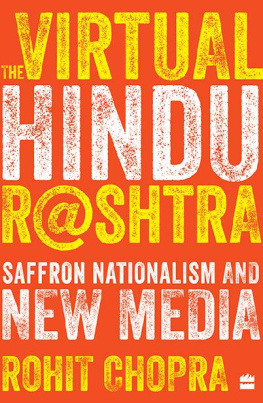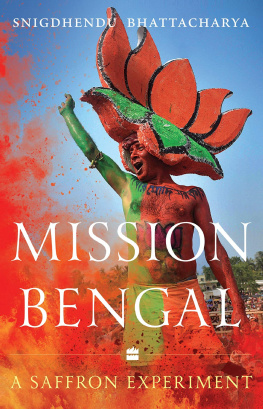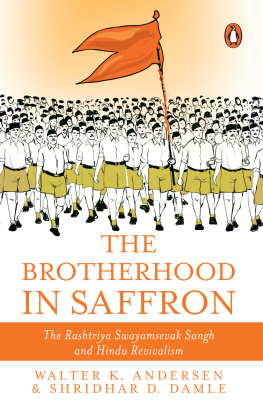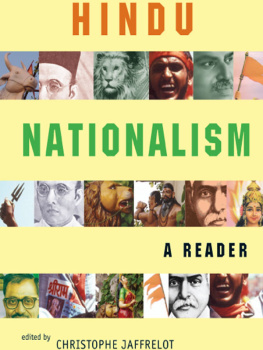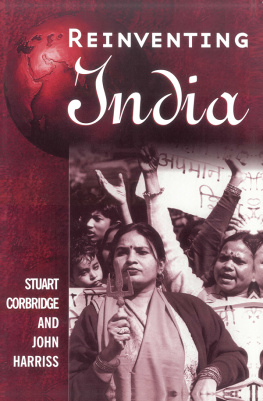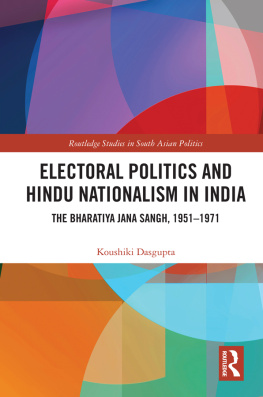Thomas Blom Hansen - The Saffron Wave: Democracy and Hindu Nationalism in Modern India
Here you can read online Thomas Blom Hansen - The Saffron Wave: Democracy and Hindu Nationalism in Modern India full text of the book (entire story) in english for free. Download pdf and epub, get meaning, cover and reviews about this ebook. year: 2010, genre: Politics. Description of the work, (preface) as well as reviews are available. Best literature library LitArk.com created for fans of good reading and offers a wide selection of genres:
Romance novel
Science fiction
Adventure
Detective
Science
History
Home and family
Prose
Art
Politics
Computer
Non-fiction
Religion
Business
Children
Humor
Choose a favorite category and find really read worthwhile books. Enjoy immersion in the world of imagination, feel the emotions of the characters or learn something new for yourself, make an fascinating discovery.
- Book:The Saffron Wave: Democracy and Hindu Nationalism in Modern India
- Author:
- Genre:
- Year:2010
- Rating:5 / 5
- Favourites:Add to favourites
- Your mark:
- 100
- 1
- 2
- 3
- 4
- 5
The Saffron Wave: Democracy and Hindu Nationalism in Modern India: summary, description and annotation
We offer to read an annotation, description, summary or preface (depends on what the author of the book "The Saffron Wave: Democracy and Hindu Nationalism in Modern India" wrote himself). If you haven't found the necessary information about the book — write in the comments, we will try to find it.
The Saffron Wave: Democracy and Hindu Nationalism in Modern India — read online for free the complete book (whole text) full work
Below is the text of the book, divided by pages. System saving the place of the last page read, allows you to conveniently read the book "The Saffron Wave: Democracy and Hindu Nationalism in Modern India" online for free, without having to search again every time where you left off. Put a bookmark, and you can go to the page where you finished reading at any time.
Font size:
Interval:
Bookmark:
Thomas Blom Hansen
WITHIN THE PAST DECADE, the Hindu nationalist movement in India, led by the militant organization Rashtriya Swayamsevak Sangh (RSS), with branches and subsidiaries in many fields of life in contemporary India, has grown into the most powerful cluster of political and cultural organizations in the country. Hindu nationalist agendas, discourses, and institutions have gradually penetrated everyday life and have acquired a growing, if not uncontested, social respectability in contemporary Indian society.
In the general elections in February 1998, the political wing of the Hindu nationalist movement, the Bharatiya Janata Party (BJP), polled more than a quarter of the popular vote in India and emerged as the largest party in the Lok Sabha in Delhi. In late March 1998, the BJP's leader, Atal Behari Vajpayee, became India's prime minister, in charge of a fragile coalition government formed by the BJP and twelve smaller regional parties. Less than two months later, on the 11th and 13th of May, in Pokhran in the Rajasthan desert, five nuclear bombs were tested. This instantaneously put India on the global map as a nuclear power and initiated a new phase in the decade-old arms race between India and Pakistan, and it generated deep worries in western governments and publics. The decision to assert India's place in the world by acquiring nuclear capabilities was met with general approval among political parties in India from left to right. The response from newspapers seemed even more positive, opinion polls indicated overwhelming support to the decision, and the BJP could now appear on the domestic scene in its much-desired role as the most resolute defender of India's national pride and its national interest. When a local RSS organizer in the western state of Gujarat told a journalist, "after the nuclear tests, many other nations have realized that India is not merely a developing nation, but a superpower," he was not merely articulating a Hindu nationalist sentiment.' His and the RSS's exhilaration at a newfound national self-respect seemed to resonate with widely held perceptions of nation, cultural pride, and India's place in global hierarchies. Complex questions of how, and why, India's Hindu nationalists could acquire the authority to enunciate this broader quest for recognition and national identity-of how and why they could ensure their popular mandate to govern-arise out of these recent events. One strand of academic work explains the current dominant position of the Hindu nationalists as the result of decades of systematic, painstaking organizational work and imaginative political strategies (Jaffrelot 1996; Basu et al. 1993). Another strand interprets Hindu nationalism in more cultural and historical terms, and argues that the Hindu nationalists could be successful because they were drawing on older reserves of "religious nationalism" that always were central to most forms of Indian nationalism (see for example, van der Veer 1994).
This book is about the processes that moved Hindu nationalism from the margins of Indian society to its center stage. It tries to incorporate both these strands of academic work on Hindu nationalism, and in some ways to go a step further. The book explores some of the broader conditions of possibility in terms of political discourse-forms of governance and political strategies-that made it possible both to enunciate the notion of a "Hindu nation," and to organize it in changing forms up to the present day. I try to understand the history and contemporary articulations of the Hindu nationalist movement in terms of how, in various periods, it was made possible (and impossible) by broader discursive formations of nationalisms; by broader issues of identity, particularly in contemporary urban India; and by continuities and discontinuities between colonial and postcolonial governmentalities, regimes, and genres of political representation.
My main argument is that Hindu nationalism has emerged and taken shape neither in the political system as such nor in the religious field, but in the broader realm of what we may call public culture-the public space in which a society and its constituent individuals and communities imagine, represent, and recognize themselves through political discourse, commercial and cultural expressions, and representations of state and civic organizations. The Hindu nationalists desire to transform Indian public culture into a sovereign, disciplined national culture rooted in what is claimed to be a superior ancient Hindu past, and to impose a corporatist and disciplined social and political organization upon society. According to the movement, the Indian nation can only be reinvigorated when its rightful proprietors, the Hindu majority, resurrect a strong sense of Hindutva (Hinduness). This majoritarian call for Hindutva combines well-established paternalist and xenophobic discourses with democratic and universalist discourses on rights and entitlements, and has successfully articulated desires, anxieties, and fractured subjectivities in both urban and rural India. I argue that Hindu nationalism represents a "conservative revolution," premised upon and yet reacting against a broader democratic transforma tion of both the political field and the public culture in postcolonial India. The intensification of political mobilization among the lower castes and the minorities has, along with the rise of ambiguous desires of consumerism in everyday life, exposure to global cultural and economic flows, and so on, fractured social imaginings and notions of order and hierarchy, not least within the large middle class and dominant communities in contemporary India. I argue that it was the desire for recognition within an increasingly global horizon, and the simultaneous anxieties of being encroached upon by the Muslims, the plebeians, and the poor that over the last decade have prompted millions of Hindus to respond to the call for Hindutva at the polls and in the streets, and to embrace Hindu nationalist promises of order, discipline, and collective strength.
One of the most remarkable features of the entire phenomenon of Hindu nationalism is the relative ease with which it has fitted into most of the authorized discourses on India and more generally on politics and culture in the postcolonial world, as they circulate inside as well as outside India. The advent of Hindu nationalism, the images of Hindu zealots razing the Babri Masjid in Ayodhya in 1992, and of firebrand orators in front of massive crowds, seem to resonate all to well with dominant perceptions of Indian democracy as somehow incomplete and immature: full of corruption, vulgar manipulators, campaigning film stars, colorful imagery presented to impressionable illiterates not capable of making qualified choices.
We should, however, remind ourselves that Hindu nationalism has emerged out of the longest, most sustained, and most successful trajectory of democracy anywhere in the postcolonial world, at the moment of its most decisive turn toward an unprecedented degree of pluralism, in the wake of the disintegration of Congress's sway over the Indian state and polity. Hindu nationalism's political success does not, in other words, grow out of the deficiencies of democracy but is the product of a series of intensely fought elections over the last decade, and of equally intense battles over religious sites, rituals, and spaces; over the meanings of shared symbols of Indian culture; over the meaning of secularism, history, and so on. However much we may disagree with the objectives and with the pompous and xenophobic style of the Hindu nationalist movement, and without exonerating its frequent reliance on violence and hate speech, we have to admit that the movement has grown and come to power largely by obeying the procedures of parliamentary democracy. The authoritarian organization of the movement and much Hindu nationalist rhetoric leave no doubt that many Hindu nationalists have only a skin-deep commitment to democratic procedures. Nonetheless, the very fact that this movement has had to respect the judiciary, the electoral process, and the "rules of the game" in the political field testifies to how well-entrenched democratic procedures are in India. At the same time, the success of Hindu nationalism has also revealed how feeble the notions of tolerance, equality, and rights have become within large groups of the relatively privileged Indians who form the core of the BJP's constituency.
Font size:
Interval:
Bookmark:
Similar books «The Saffron Wave: Democracy and Hindu Nationalism in Modern India»
Look at similar books to The Saffron Wave: Democracy and Hindu Nationalism in Modern India. We have selected literature similar in name and meaning in the hope of providing readers with more options to find new, interesting, not yet read works.
Discussion, reviews of the book The Saffron Wave: Democracy and Hindu Nationalism in Modern India and just readers' own opinions. Leave your comments, write what you think about the work, its meaning or the main characters. Specify what exactly you liked and what you didn't like, and why you think so.

